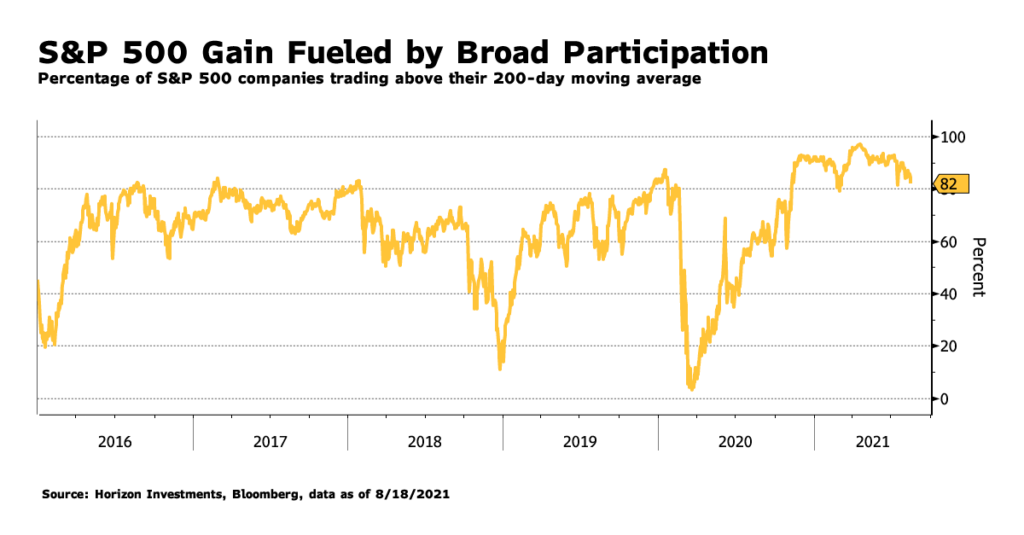82% of the stocks in the S&P 500 are trading above their respective 200-day moving average, our research shows that’s a potential harbinger of the equity market producing excess returns over the Bloomberg Barclays Aggregate Bond Index.
The dog days of summer are turning out to be anything but sleepy in the stock market. Of August’s 12 trading sessions, eight of them have produced record closing highs for the S&P 500.
That comes amid rising macroeconomic uncertainty, including rising Covid cases, reports of busy hospitals, a plunge in consumer confidence in the monthly University of Michigan survey, China’s regulatory crackdown, and the Taliban’s resurgence in Afghanistan.
Does it still make sense to overweight stocks given the cloudy conditions? Horizon Investments looked at whether the broad participation of companies in the current rally – 82% of S&P 500 stocks are trading above their 200-day moving average – has any predictive value?
What we found was that, since 2015 when breadth was at its current level, the S&P 500 produced a median excess return of 2.5% versus the Bloomberg Barclays Aggregate Bond Index over the next 20 trading sessions. So long as the breadth figure remains near current levels, history would suggest that stocks should produce superior returns over bonds in the near-term.
Investors, understandably, can feel nervous about sticking with stocks at all-time highs, especially if their financial goal is coming into view. For a client in that situation, financial advisors may want to assess if their client’s risk profile is shifting to being more worried about a catastrophic loss.
If that is determined to be the overriding risk, then that client has entered what Horizon calls the Protect stage and is no longer in Gain, where volatility is the primary risk. Horizon Investments believes that an investor’s fundamental risk changes as they enter a new stage of their financial journey (read our Redefining Risk paper to understand our goals-based investing philosophy.)
For goals-based investors who still want to accumulate wealth, yet are nervous with equities at all-time highs, they may want to consider Horizon’s Risk Assist® strategy. It is designed to keep a client fully exposed to markets while conditions are normal. However, if conditions severely deteriorate, the Risk Assist® algorithm uses a disciplined, systematic process to dynamically “de-risk” the portfolio with the aim of achieving a specific loss tolerance range. As conditions improve, the algorithm uses the same process to “re-invest.”
The Risk Assist® strategy also includes a “ratcheting” feature, which raises the loss tolerance threshold as the portfolio value grows, typically with every 3%-5% of appreciation. For each ratchet, Horizon sent advisors a real-time alert.
To download a copy of this commentary, click the button below.
Further reading:
Corporate America’s Profit Machine Is as Strong as Ever
Are Glide Path Strategies Still a Good Option for Retirement?
Americans Taking Early Retirement May Benefit From a Goals-Based Solution
Junk-Bond Yields Don’t Provide Much of a Cushion Against Inflation
Abnormally Low Interest Rates to Remain Even If Fed Hikes in 2023
If Inflation Returns, Bond’s Diversification Power May Disappear
Essentially Nothing. That’s How Much Bonds May Return Over Next Five Years
It’s Getting Harder to Fund Retirement Using Bonds
1 Bureau of Labor Statistics, https://www.bls.gov/news.release/archives/empsit_07022021.htm
2 Vanguard, https://institutional.vanguard.com/content/dam/inst/vanguard-has/insights-pdfs/21_CIR_HAS21_HAS_FSreport.pdf
3 Society of Actuaries, 2020
Nothing contained herein should be construed as an offer to sell or the solicitation of an offer to buy any security. This report does not attempt to examine all the facts and circumstances that may be relevant to any company, industry or security mentioned herein. We are not soliciting any action based on this document. It is for the general information of clients of Horizon Investments, LLC (“Horizon”). This document does not constitute a personal recommendation or take into account the particular investment objectives, financial situations, or needs of individual clients. Before acting on any analysis, advice or recommendation in this document, clients should consider whether the security in question is suitable for their particular circumstances and, if necessary, seek professional advice. Investors may realize losses on any investments. Index information is intended to be indicative of broad market conditions. The performance of an unmanaged index is not indicative of the performance of any particular investment. It is not possible to invest directly in an index.
Past performance is not a guide to future performance. Future returns are not guaranteed, and a loss of original capital may occur. This commentary is based on public information that we consider reliable, but we do not represent that it is accurate or complete, and it should not be relied on as such. Opinions expressed herein are our opinions as of the date of this document. These opinions may not be reflected in all of our strategies. We do not intend to and will not endeavor to update the information discussed in this document. No part of this document may be (i) copied, photocopied, or duplicated in any form by any means or (ii) redistributed without Horizon’s prior written consent.
The Real Spend® retirement income strategy is NOT A GUARANTEE against market loss and there is no guarantee that the Real Spend® strategy chosen by an investor will be successful for the entirety of an investor’s retirement. Clients may lose money. Real Spend® is an asset allocation strategy that uses an investment model to (i) plan savings amounts and overall asset allocation during the distribution phase of retirement planning, (ii) compute target retirement wealth, assuming a retirement budget and a spending-investment strategy after retirement, (iii) compute the transition from the accumulation phase to the retirement phase, and (iv) generate the spending-investment strategy after retirement. Our retirement spending investment strategy uses an allocation model that replenishes cash needed for withdrawals. Before investing, consider the investment objectives, risks, charges, and expenses of the strategy. All investing involves risk. This strategy is not an insurance product with payments guaranteed. It is a strategy that invests in marketable securities, any of which may fluctuate in value. There is a possibility of outliving the assets if market performance is lower than forecasts used in planning, or if longevity is longer than anticipated.
Other disclosure information is available at www.horizoninvestments.com.
Horizon Investments and the Horizon H are registered trademarks of Horizon Investments, LLC
©2021 Horizon Investments LLC

